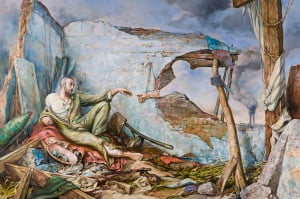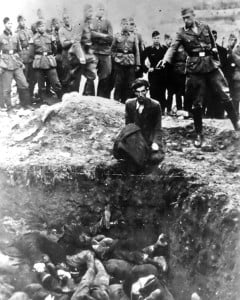Our group spent a good bit of time walking around Warsaw and seeing its sites. The first thing to realize about Warsaw is that it is an old looking but newly constructed city. Our guides said that the Germans destroyed at least half the city when they captured it in 1939. The destruction of the Warsaw Ghetto in 1943 after the suppression of the Rebellion accounted for 10 per cent more destruction and the failed uprising of August - October 1944 destroyed another 25 per cent and depopulated what had been a city of 1.3 million. We saw a film of the destruction in the Museum of the Warsaw Uprising and the visual record is a stunning one. Entire neighborhoods were obliterated and less than 1000 lived amidst the rubble. Two hundred thousand Poles, some of them Jewish survivors of the Warsaw Ghetto Uprising, lost their lives--many simply shot randomly on street corners (marked throughout the city).
Jack Lipinsky
Recent Posts
Topics: Professional Development, History, Genocide and Crimes Against Humanities Course, Personal history
We always say that Canada is a young country, but that never hits home till you come to Europe. Here I am in Krakow, the old imperial capital of Poland, whose existence is first mentioned by a Jewish merchant in 965 CE. A city gradually grew on this important trade route near the important salt mines of Bochnia, which would eventually account for 30% of Poland's national income in the 15th and 16th centuries.
Topics: History, Memorial, Genocide and Crimes Against Humanities Course
Rethinking Teaching is Hard but Rewarding: Some Thoughts on Facing History's latest workshop
Posted by Jack Lipinsky on May 29, 2013
Being a teacher keeps me thinking and growing all the time. It seems that as I age, my skills must get ever nimbler even as my legs fail to keep pace. I find that I am spending more and more time reflecting on how to create lessons that have a lasting impact, which leaves me less time to prepare the actual lesson. To speed the process, I needed a rubric for reflection--and Facing History's wonderful workshop on Urban Education that took place on 27 May was the perfect prescription. I want to share the highlights with you!
Topics: Professional Development, Urban Education
Where was God during the Shoah? Jewish students seek answers in Art and Tradition
Posted by Jack Lipinsky on April 21, 2013
One of my most powerful childhood memories is seeing "The Ten Commandments" in the original "Cinemascope" at the now demolished Glendale Cinema on Avenue Road. I never forgot the grandeur of the huge screen especially in scene where Moses (Charlton Heston) epically raised his arms with the Rod of God aloft, and the sea crashed down upon the pursuing Egyptians while Pharaoh (Yul Brynner) gasped in awe and said: "The Lord is God." So much for nostalgia. I wonder what Moses would have said watching a synagogues of Germany burn down on Kristallnacht when firefighters stood idle and crowds gathered to gawk? He might well have asked, as do my students, "where was God"?
Topics: History, Holocaust Education, Lesson Ideas
Avoiding Victimhood: enticing our students to think critically about Genocide
Posted by Jack Lipinsky on April 21, 2013
My last couple of posts have focused on the educational methodology of teaching media savvy students how to examine visual evidence of the Shoah. I have recorded some of our class conversations and you must wonder: what is the atmosphere like in this classroom? Is it terribly negative considering what is being learned? Mustn't it be especially upsetting for students in a Jewish day school to learn the horrific details of the Shoah, the Holocaust, that wiped out an entire Eastern European civilization? My students find this study enlightening and are not depressed but eager to learn more and empowered by what they discover. I would like to share how this can be done. For me, this is an issue that transcends ethnicity, nationality, or religion. How are students affected by learning about genocidal attempts that strike 'close to home"? Let me begin with a story that exemplifies what Facing History is all about.
Topics: Professional Development, Genocide and Crimes Against Humanities Course
"The Last Jew in Vinnitsa": How Media provides a way to understand Perpetrators/Bystanders/Victims
Posted by Jack Lipinsky on April 7, 2013
Graphic imagery is used in this lesson. Please read the full post before teaching this.
I start by displaying the famous photo called "The Last Jew in Vinnitsa."
I say, "This was the title given by the Einsatzgrup soldier in whose pocket it was found, scribbled on the back. Vinnitsa is a small town in the Ukraine whose entire Jewish population was wiped out by the Einsatzgruppen mass killing methods in 1941."
This is all I tell my students when displaying this picture. They have already learned about the Einsatzgruppen and read the selection on "Battalion 101" in Holocaust and Human Behaviour Chapter 7 Reading 3 . They have also been taught that there are three groups involved in genocide: perpetrators, bystanders, and victims.
Topics: History, The Last Jew in Vinnitsa, genocide, Genocide and Crimes Against Humanities Course, Lesson Ideas, reflection
Using Visual Media to Learn about Genocide--OR--Goodbye "boring" History classes
Posted by Jack Lipinsky on April 7, 2013
In my last post I noted how saturated our students are by visual media. What a sharp contrast their lives are with mine at their age. In my high school history classes, the walls were adorned with old men, mostly with mutton chop whiskers and beards, staring down at me. Each of them had their name, dates of birth and death, and a sour stare that intimidated me when I glanced at them. My teachers reverently cited these old mens' careers and quoted them to the point of endless boredom.
Topics: History, Middle School, Strategies, Genocide and Crimes Against Humanities Course, Lesson Ideas
My Grade 8 students love their smartphones and computers. One of the most important jobs I have is to teach my students how to "curate" what's out there. My 20 year old son who takes Advertising at OCAD taught me the new meaning of this old word. "Curate" conjures up visions of dusty museum cases and stuffed animals--right? Well, these have gone the way of the dodo, as have the old style museum exhibitions. You've seen the exciting new ways in which curators present information today, especially with the Royal Ontario Museum so close at hand. The new curators' challenge is to choose and organize what is out there to make the maximum impression on viewers bombarded by visual media. For us, that means teaching our students how not to drown in Google hits, how to separate the wheat from the chaff, and what sites are actually useful to them.
Topics: History, Middle School
It's January already and a new year! NHL hockey has returned, and my students remind me endlessly of how they intend to breathlessly watch the revival of rivalries they already have grown to love. Many of them also play hockey for various teams, some for school teams as well. They are busy with all kinds of social events and spend endless hours surfing the Net, on Facebook, enjoying TV shows, and a bit of time doing homework.
Topics: Middle School, Genocide and Crimes Against Humanities Course



